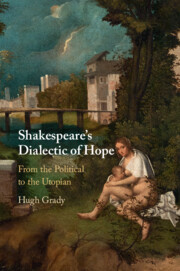Book contents
- Shakespeare’s Dialectic of Hope
- Shakespeare’s Dialectic of Hope
- Copyright page
- Dedication
- Contents
- Acknowledgments
- Part I
- Introduction to Part I Shakespeare and the Political
- Chapter 1 Julius Caesar and Reified Power
- Chapter 2 Macbeth
- Chapter 3 Baroque Aesthetics and Witches in Macbeth
- Part II
- Bibliography
- Index
Chapter 2 - Macbeth
A Tragedy of Force
from Part I
Published online by Cambridge University Press: 02 June 2022
- Shakespeare’s Dialectic of Hope
- Shakespeare’s Dialectic of Hope
- Copyright page
- Dedication
- Contents
- Acknowledgments
- Part I
- Introduction to Part I Shakespeare and the Political
- Chapter 1 Julius Caesar and Reified Power
- Chapter 2 Macbeth
- Chapter 3 Baroque Aesthetics and Witches in Macbeth
- Part II
- Bibliography
- Index
Summary
Chapter 2 investigates Macbeth as representative of the next stage of Shakespeare’s political thinking in the tragic period, focusing on issues of power specifically to reveal the version of instrumental reason (or power for power’s sake) Shakespeare explores in this dark play. This includes the play’s implied conception of the political and its relation to dramatic structure. In the specific case of Macbeth, the form of politics is best described using Simone Weil’s 1940s anti-war essay “The lliad, or the Poem of Force” to define the issues involved, seeing the play as an anatomy of political force manifesting like The Iliad the destructive effects on both its agents and its victims of the deadly instrumental politics of warfare. In this analysis, Macbeth emerges as a consummate man of force parallel to Homer’s Achilles as described by Weil, while Lady Macbeth is a figure sharing his commitment to force but constrained by her society’s patriarchal structure and values to a publicly subordinate (though privately powerful) role. The Macbeths’ political actions enable the introduction of modern autotelic instrumental power to a fictional and temporally complex Scotland.
- Type
- Chapter
- Information
- Shakespeare's Dialectic of HopeFrom the Political to the Utopian, pp. 42 - 59Publisher: Cambridge University PressPrint publication year: 2022



